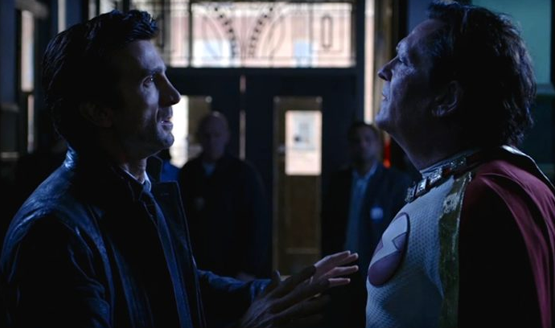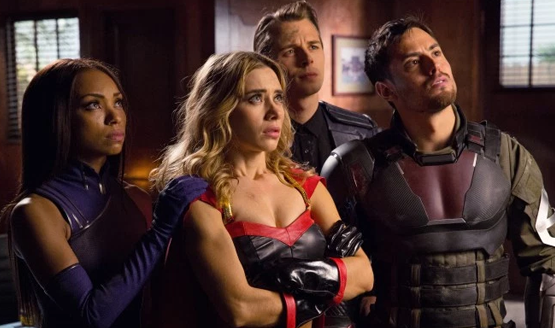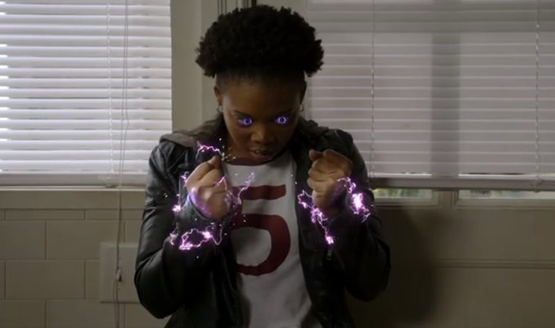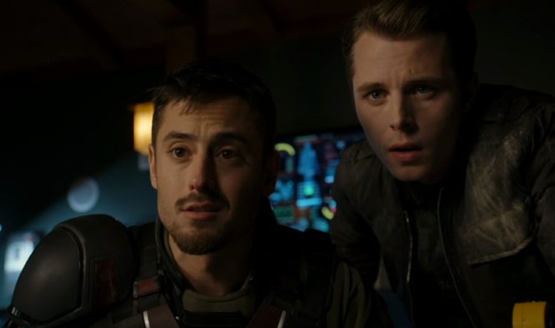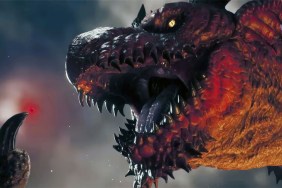To read our reviews of episodes 1-3 of Powers season two, click here, episode 4 here, episodes 5-6 here, episode 7 here, episode 8 here, episode 9 here. To check back on all of our Powers coverage, including reviews of season one, click here. The review below contains spoilers for the previous episodes of Powers, as well as spoilers for episode nine.
Powers’ second season has come to a close, and its finale, Legacy, leaves a lot hanging in the balance. Unlike the end of the first season, where I didn’t want to hear that it had been renewed, season two’s cliffhangers have my eagerly awaiting the announcement of a third set of episodes. That’s not to say that Legacy didn’t have its flaws, but the final confrontation with SuperShock left me much more satisfied than the conclusion of the Wolfe/Royale saga.
With Morrison captured — which does get satisfyingly explained as his powers have waned to non-existence over the last half century — powers division attempts to use his presence to draw SuperShock in. What their intentions were at this point are unclear, but I guess getting him away from murdering dozens of powers and talking to Walker, Cross, and the rest is a start while they figure out what to do next. Of course things go awry because SuperShock is basically insane, and any rationally logical plan isn’t go to do anything. After a pathetically forced attempt by the ragtag New Unity to take him down (seriously, what were they thinking rushing in like that?), he blasts off after sending shockwaves across LA.
Legacy only offers continuing evidence that season two has grossly mishandled New Unity. After the death of Triphammer they’ve been pretty stagnant, first adding Calista, and most recently the reluctant Krispin, who still apparently has some internal conflicts with hating a power yet being one himself. In Legacy they get to be Walker’s glorified Uber, and a massive psychological distraction so that Walker can convince SuperShock to fly into the sun. That’s it. By trying to divide the season in two halves, they wasted a lot of opportunities for New Unity to be a real part of the conflict — making mistakes and growing as a team — effectively relegating them to a disconnected corner once their mentor is gone.
New Powers, Old Powers
Pilgrim’s newfound powers continue to be a mystery, with the seemingly disparate mix of the ability to short out electrical devices and poison breath, coupled with a near uncontrollable rage (while somehow retaining extremely precise control over her abilities during these periods). She also apparently has the ability to heal, even after having her heart ripped out of her chest by an angry and confused SuperShock and then hilariously stuffed back in as he tries to “fix” her. I wish that her fate would have been left in question until season three (though she’s too much of a core part of Powers to kill off), with our last image being her lying on the ground with a hole in her chest. Instead we see her wake up in a hospital as part of the post credits scene.
How do you take down the world’s mightiest and oldest power? Not with brute force, as evidenced by both of New Unity’s attempts to throw themselves at him like four wet noodles at an industrial meat grinder. In spite of SuperShock’s ability to easily kill other powers, none of New Unity comes away even remotely injured — aside from Krispin, who has ability is to painfully die and come back to life. Instead of being an important part of this final showdown, he and the rest of the team are cannon fodder, waiting for Walker to step in and play his final part.
Dressed as Diamond, Walker comes in and confronts SuperShock psychologically, sacrificing himself by claiming to have been Morrison all along (or The Ghost, or The Destroyer. That guy has a lot of names). In an emotionally charged final scene, he convinces SuperShock that the only way to end this age old game is to fly them both into the sun. This is intercut with news reports indicating that the government is now cracking down, making the use of powers illegal. Of course this is a common anecdote in comic culture, most recently in Captain America: Civil War, so it was only a matter of time before it became a plot point in Powers.
The Truth is Out There
As with Pilgrim, it’s pretty clear that Walker isn’t going to die, no matter how emotional they want to make his sacrifice seem. The hints of his powers returning throughout the season set the stage for his surviving the trip into the sun, and the scene after the credits shows a naked Walker surrounded by a bright light while a couple of celestial voices talk about him being a good candidate and prepping him for the stage two trials. The following silence is punctuated by Walker’s screams. Angels? Aliens? Government conspiracy (I admit, I’ve been watching a lot of X-Files lately)? If the story follows the comics, Walker will be appointed Earth’s protector (much like a Superman type figure), and it will be interesting to see how his newfound responsibility conflicts with the world’s increasing fear of powered individuals.
Powers still struggles with explanation in some cases, which can happen when a creator is too close to a project. They inherently know their own backstory and intentions so things seem more clear to them than they appear to the audience. Reading the Powers graphic novels does help give an idea of which story elements they are pulling from (though the show doesn’t directly follow the graphic novels at all), but the viewer shouldn’t need to read supplemental material in order to have an understanding of characters or plot points.
The easiest fix is to step back and spread out the plot lines a little. Save the whole Morrison/SuperShock cat and mouse conflict for season three, give more time, training, and relevance to New Unity. The original plot of season two — Moody, Heavy, the FBI — all of these points should have persisted through the end of the season but they were hastily rushed to conclusion with minimal buildup or fanfare. Stretch out their backstories a bit. Help the viewer to understand a little more about these characters, their relationships with other characters, and the psychology behind it all instead of just rushing from one plot point to the next. Season two accomplished this much more effectively than season one’s disparate story that I had a hard time caring about, but it still faltered in connecting with the viewer.
A Beautiful Mind
Instead of focusing on the big action scenes, Powers has always been about the psychology of having powers, dealing with other powers, and the sociological relationships of everyone on the show. It’s less about clear lines between good and evil, but mixing it up in the gray area in between where those boundaries are not clearly defined. SuperShock wasn’t inherently bad, just driven mad over years of living with his powers, and his constant cat and mouse game with Morrison. Krispin has every reason to hate powers but becomes one himself. Delving into these characters’ psyches is what makes the show interesting, but rushing a grip of plot points to fit into ten episodes puts too much of the psychological aspect on the back burner.
Powers’ second season improved over the first in every way, but they shouldn’t rest on their laurels. At this point, a third season is basically a foregone conclusion. I’d like to see the pace slowed for season three, giving a real opportunity to explore the characters’ cognitive relationships, drawing tension from a long looming villain, or from those internal dilemmas that each character must face. These characters are intriguing and deserve to be given screen time and narrative justice. Meanwhile I’ll face my own internal dilemma as I am forced to wait another year before seeing what happens next.
There is not yet word on Season Three of Powers. Season’s One and Two are completely available for everyone with a PlayStation Plus members. Everybody can watch the first episode of Season Two here.
